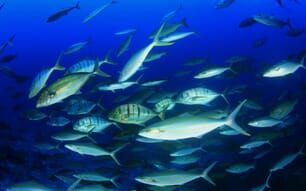The move follows the development of a similar initiative to build a larger "blue" economic zone in Shandong, the county's home province, write Zhao Ruixue and Ju Chuanjiang, ChinaDaily. According to the news organisation, president Hu Jintao gave his blessing to the project during his inspection tour of the area in April.
Jiang Qingchun, Party secretary of the county committee, said: "We will spare no efforts to play a leading role in establishing a blue economic zone around the Shandong Peninsula. We will devise our own development blueprint and transform Changdao into an environmentally-friendly and highly civilized county."
During 2008 the county won a string of honors, establishing it among China's first tranche of sophisticated, contemporary regions with sustainable economies and a developed tourism base.
Jiang said: "Changdao's advantages all stem from the sea. Capitalizing on maritime resources and accelerating the speed of developing an eco-fishing program, together with a number of environmentally friendly industries and an eco-tourism base are our best options for sustained growth."
The authorities' ambitious goals include the construction of a national eco-fishing model area with 1 million mu (66,666.7 hectares) of underwater forests and fish farms of more than 1 million mu (66,666.7 hectares) in size and the formation of a national ocean energy base intended to generate 1 million kilowatts in wind power. They also plan to develop an internationally known holiday resort projected to attract 1 million high-end tourists annually.
Eco-aquaculture farm
Sun Yubin, director of the county's Oceanic and Fishery Bureau (OFB), said developing aquaculture farms will put Changdao on a sustainable growth track and create a highly-efficient modern fishing industry.
The man-made underwater 'seaweed' is expected to provide a superior environment for ocean organisms and thus create conditions for multi-layered cultivation methods. This will see kelp kept in the upper layer, fish and shellfish in the middle layer and valuable seafood items, including abalone and sea cucumber, nurtured on the deepest level.
Statistics from OFB show Changdao's submarine forest and ecological fish farms currently extend to 400,000 mu (26,667 hectares) and 600,000 mu (40,000 hectares). Seafood output value enjoyed a 29 percent year-on-year increase during 2008.
Another 600,000 mu (40,000 hectares) of undersea forests and 400,000 mu (26,667 hectare) of eco-fish farms are expected to be built within the next five years. The fishing base will then cater for such ocean species as abalone, sea cucumber, sea urchin, scallop and kelp.
Li Naisheng, deputy director of the Department of Science and Technology of Shandong province and a director of the National Oceanographic Center in Qingdao (NOCQ) said: " Changdao's large-scale eco-aquaculture is now at an internationally advanced level and will set an example for other coastal areas looking at developing an aquatic industry."


